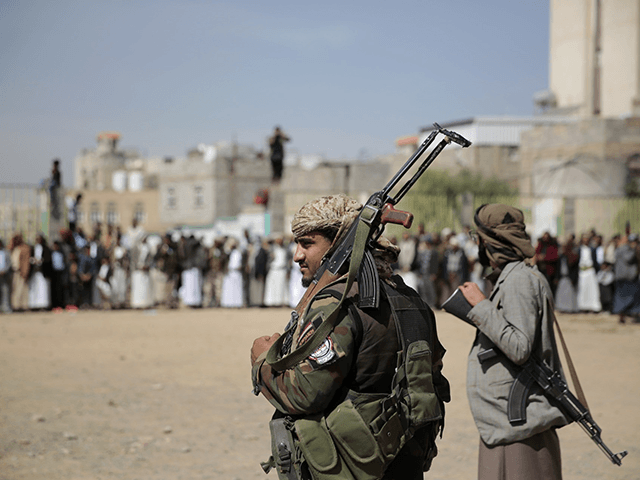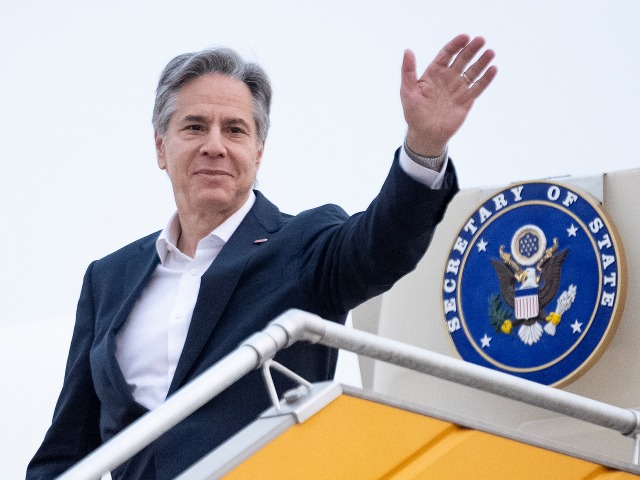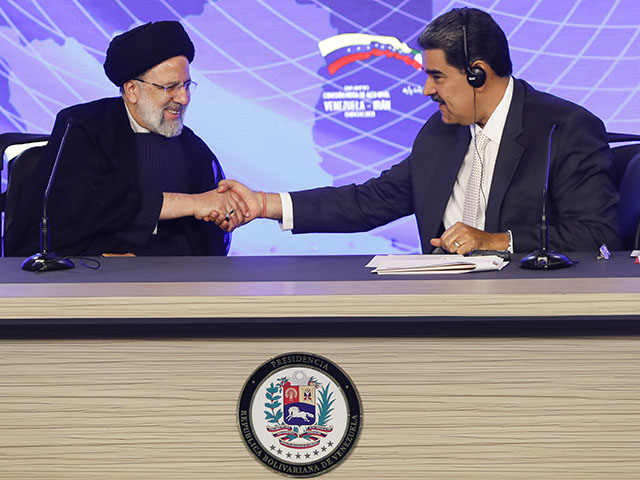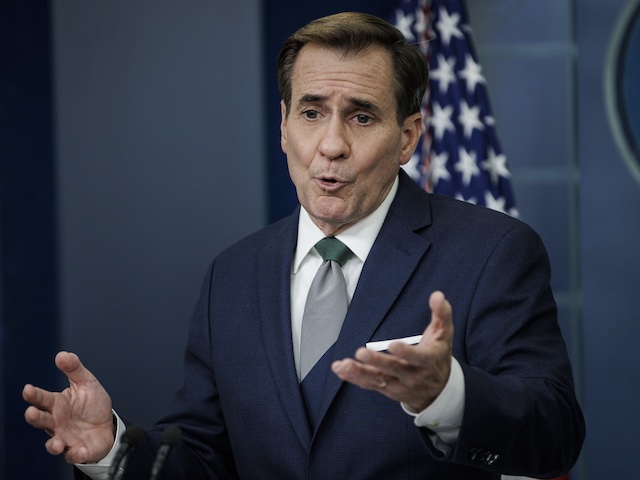How Biden Helped Fund Hamas’s Allies Before Unprecedented Israel Attack
Entities known to maintain friendly ties to the Palestinian terrorist organization Hamas, from the Iranian Islamist regime to Venezuelan socialist dictator Nicolás Maduro, have enjoyed years of financial benefits from eased sanctions under leftist President Joe Biden – benefits meriting closer scrutiny in light of the unprecedented wave of terrorism striking Israel on Saturday.
Israeli authorities estimate that over 300 people have died and identified nearly 1,600 wounded in the past 24 hours as a result of thousands of rocket bombings and waves of street attacks against civilians. Reports indicate that Hamas terrorists took an unknown number of Israeli civilians – estimated to total in the dozens and include women, children, and elderly people with dementia – hostage. Terrorists have flooded social media with graphic videos appearing to show the torture of hostages.
Hamas has branded the terror spree the “al-Aqsa Deluge” and vowed that the attacks would continue indefinitely.
The Palestinian terror attack happened on the Jewish holiday of Shemini Atzeret, the final day of the annual High Holy Day cycle.
The attacks followed years of Biden administration policies aiding supporters of Palestinian terrorism. Most recently, in September, a report revealed that the State Department granted over $90,000 in funding to the Phoenix Center for Research and Field Studies in Gaza, a “non-governmental” group that describes itself as supporting “armed resistance” against Israel.
Less directly, but perhaps more influentially, the Biden administration has aided some of Hamas’s most high-profile international supporters.
While a Sunni Arab organization, Hamas has long maintained close ties to the Shiite regime in Iran. After a brief chill in relations during the early years of the Syrian Civil War, the Islamic regime and the terrorist organization restored their association to the point that the head of Hamas identified Tehran as its “largest backer financially and militarily.” Military experts studying drones used during the attack on Saturday suggested that they were at least inspired by Iranian designs, if not outright Iranian-made weapons.
The “supreme leader” of Iran, Ayatollah Ali Khamenei, celebrated the carnage on his Twitter account on Saturday, writing, “God willing, the cancer of the usurper Zionist regime will be eradicated at the hands of the Palestinian people.”
God willing, the cancer of the usurper Zionist regime will be eradicated at the hands of the Palestinian people and the Resistance forces throughout the region. #AlAqsaStorm pic.twitter.com/XDyxoTT4gw
— Khamenei.ir (@khamenei_ir) October 7, 2023
Appeasement policies towards Iran have been a cornerstone of the Biden administration’s approach to the Middle East. Tehran most recently received word that the White House would move to allow it to access $6 billion in assets frozen as part of sanctions on the country for its funding of terrorist activity. Biden reportedly traded the $6 billion for the release of five Americans held hostage in Iranian prisons. The United States reportedly facilitated the unfreezing of the $6 billion, held in South Korea, and the transfer of the money to Iranian ally Qatar before the Americans were freed.
“This is not a ransom,” White House National Security Council Coordinator for Strategic Communications John Kirby insisted in August, before reports citing Biden administration officials confirmed the agreement on September 11.
Khamenei marked the anniversary of the September 11, 2001, jihadist attacks with a speech celebrating the demise of the United States.
“The main lines of this transformation are several things: First of all, the weakening of the world’s arrogant powers,” Khamenei said. “They themselves say that the indicators of American power in the world like economy are declining. One of the most important indicators of American power was the strong American economy; they say it is declining.”
“Hamas is being funded and equipped by Tehran … which the U.S. has been appeasing and enabling in recent months, as billions of dollars have flowed into the regime’s coffers,” Jake Wallis Simons, editor of the Jewish Chronicle observed this weekend.
The $6 billion gift bookends a policy that began early in the Biden administration. In June 2021, Biden lifted sanctions on three former Iranian officials and two companies sanctioned for engaging the Iranian oil industry, on the grounds that the targeted entities had allegedly made a “verified change in behavior or status.”
One of Biden’s first acts in office – in February 2021 – was the removal of one of Iran’s closest terrorist allies in the region, the Yemeni Houthi movement, from the American government’s list of designated foreign terrorist organizations. The Houthis, also known as Ansarallah, have engaged in a bloody civil war in Yemen for nearly a decade under their slogan, “Allah is great, death to the United States, death to Israel, curse the Jews, victory for Islam.”

Armed Houthi fighters attend the funeral procession of Houthi rebel fighters who were killed in recent fighting with forces of Yemen’s internationally recognized government, in Sanaa, Yemen, on Nov. 24, 2021. A clan-based militia government in the Arab world’s poorest country is presenting the Biden administration with its latest foreign policy frustrations. Yemen’s Houthis have launched three cross-border strikes with drones and ballistic missiles into the United Arab Emirates in as many weeks. (AP Photo/Hani Mohammed, File)
Secretary of State Antony Blinken plainly stated that the revocation of the terror designation was not as a result of the Houthis ceasing to engage in terrorist activity. Rather, the objective of lifting the sanctions was to allow money to flow into Houthi-controlled areas of Yemen, allegedly.
“By focusing on alleviating the humanitarian situation in Yemen, we hope the Yemeni parties can also focus on engaging in dialogue,” Blinken said at the time.

US Secretary of State Antony Blinken waves as he boards his plane at Hanoi Airport in Hanoi on April 16, 2023, to travel to Japan for the G7 Foreign Ministers’ Meeting. (Photo by Andrew Harnik / POOL / AFP) (Photo by ANDREW HARNIK/POOL/AFP via Getty Images)
Rather than “focus on engaging in dialogue,” the Houthis expanded their terrorist activities into Saudi Arabia.
While a Shiite terrorist group, the Houthis and the leaders of Hamas have publicly expressed solidarity with each other’s causes, even in the face of criticism from their supporters.
Across the globe, in Venezuela, the Biden administration has also worked to ease sanctions on the socialist regime’s oil industry, despite a documented, long-term relationship between dictator Nicolás Maduro and terrorist groups such as Hamas and Hezbollah. The largest windfall to Venezuela came in the form of the Biden administration allowing the American company Chevron to begin “limited” oil production in the country, which requires cooperation with Maduro’s state oil corporation, Petróleos de Venezuela (PDVSA)

Venezuelan President Nicolas Maduro (R) and Iranian President Ebrahim Raisi (L) attend Venezuela – Iran Joint Commission in Caracas, Venezuela on June 12, 2023. Venezuela is the first stop of Raisi’s Latin America tour, which includes Cuba and Nicaragua. (Photo by Pedro Rances Mattey/Anadolu Agency via Getty Images)
.
Oil production, which cratered after decades of socialist mismanagement of PDVSA facilities and sanctions on the oil industry, has skyrocketed since November in the country. Venezuela jointly announced with the dictatorships of Iran and Syria last week that all three would soon collaborate on the construction of an oil refinery in Homs, a hollowed-out former opposition stronghold during the Syrian Civil War. All three will profit from the completed operation.
The three countries had initially announced an interest in building such a refinery in Homs in 2017, but did not follow up on the plan after President Donald Trump imposed heavy sanctions on both Iran and Venezuela.
Iran and Venezuela have been close allies since the tenure of late dictator Hugo Chávez. Then a foreign minister, Maduro reportedly first met with the head of Hezbollah, Hassan Nasrallah, in 2007, to cut a deal on allegedly aiding the jihadists in procuring weapons, profiting from drug trafficking, and receiving passports. In 2020, the U.S. government charged a close associate of Maduro’s, Adel El Zabayar, with engaging in narco-terrorism through the attempted sale of cocaine in America to fund Hezbollah and Hamas.






Comments are closed.